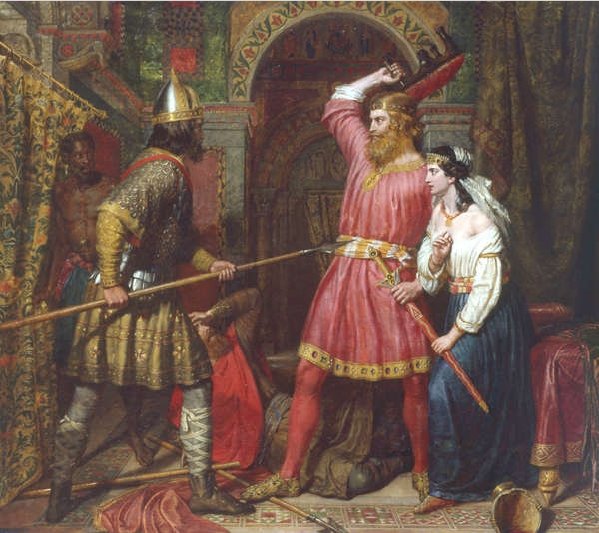
The legendary King Alboin led the Lombards into Italy, destroyed the Gepids, defeated the Byzantines, and was immortalized in epic poetry as far away as Anglo-Saxon England - but was ultimately killed by his own wife. A thread: 

Alboin was born in Pannonia, then the homeland of the Lombards, sometime in the 530s. His father, Audion, was their king, but this didn't automatically mean Alboin would be as well - Lombard kings were still chosen by an assembly of freemen. Both were still pagan. 

The great enemy of the Lombards at this time were the Gepids, another Germanic tribe. Still a young man, Alboin distinguished himself in battle against them, at the Battle of Asfeld in 552, where he killed Turismod, son of the Gepid king Thurisind. 

At the time, the Lombards were aided by the Byzantines under Emperor Justinian. They were reconquering Italy from the Ostrogoths, and their diplomacy long aimed to balance barbarian tribes against each other. They saw the Gepids as the greater threat the Byzantine territory. 

When his father died in around 565, Alboin was elected king. Immediately afterwards, he went to war with the Gepids again, now under Thurisind's son Cunimund. It's not clear who started the war - some sources say the Lombards and others the Gepids.
According to Theophylact Simmocatta, a Byzantine historian, the war began because Alboin tried to court Rosamund, Cunimund's daughter. When he failed he kidnapped her. Some modern historians doubt this, and it's not as if the Lombards and Gepids needed a special reason to fight.
However, the Byzantines changed sides. Under Justinian's successor, Justin II, they made a deal with the Gepids, offering support in exchange for the return of the city of Sirmium. A combined Byzantine-Gepid army crushed Alboin, bringing the Lombards to the brink of destruction. 

Desperate, Alboin turned to the Avars, a steppe empire and longtime enemy of the Byzantines. They agreed to help, but their terms were harsh - in addition to massive amounts of cattle and gold, they demanded any land taken from the Gepids. Alboin agreed. 

Cunimund had also angered the Byzantines by going back on his promise to hand over Sirmium, and they withdrew their support. In 567, the Lombards and Avars invaded. Alboin killed him somewhere near the Danube river and the Gepids ceased to exist as an independent state. 

To solidify his hold over the Gepids and, if Theophylact is to be believed, slake his own lust, he married Rosamund shortly afterwards. However, Alboin's deal with the Avars had created a force far too powerful for him to manage, and he feared he was next on their hit list. 

He needed to leave, and there was one obvious location - Italy. It had only recently been retaken by the Byzantines, who were weakened by decades of fighting with the Ostrogoths, the Plague of Justinian, and infighting among their own generals. It was ripe for the taking.
The Byzantine Empire was also threatened by the Slavs and Avars, both of which were closer to the heartlands around Constantinople and higher priorities than Italy. Much of the army in Italy was made up of Goths, some of whom had only recently been fighting against them.
Alboin's followers, numbering between 100,000-300,000 including civilians, included not only Lombards but also remnants of the Gepids and a force of Saxons, among others. Recently converted to Arian Christianity, he set off on Easter Monday, April 2 568.
According to Paul the Deacon, a Lombard chronicler, he met no resistance from the poorly motivated Byzantine border troops. He took Cividale de Friuli and made his nephew, Gisulf, Duke of Friuli, with the responsibility of defending the Eastern border of Italy. 

Duke, or Latin Dux, was a Roman military post responsible for commanding the border troops in part of the frontier. Establishing one as the head of a city and the territory surrounding it, instead of a civilian official, was a sign of militarization and the growth of feudalism. 

Alboin's army swept across northern Italy, taking city after city with minimal resistance. He took Aquileia, administrative capital of Venetia, and in 569 took Milan. Refugees fled his advance to Byzantine held cities along the coast, but no army was sent to stop him. 

In 569 he laid siege to Pavia, which put up the first serious resistance of the invasion. It took him three years to take it. During the siege, his authority began to break down - his army was a collection of the retinues of individual warlords, and they only respected success. 

Some went south on their own, setting up independent duchies. Alboin launched attacks on the Franks in 570, but these were repulsed, earning him the enmity of that powerful kingdom. He established his capital in Verona, at the old palace of the Ostrogoths. 

According to Paul the Deacon, after killing Cunimund he made his skull into a drinking cup, and when celebrating his victory forced his wife to "drink merrily with her father." Along with her secret lover Helmichis and Alboin's chamberlain Peredeo, she began plotting against him. 

On June 28, 572, she left the door of his bedroom unlocked and hid his sword. When Peredeo entered to kill him, the king could offer no resistance and was slain. Helmichis married Rosamund and was crowned king, backed by the Lombard garrison in Verona. 

However, most of the Lombard army turned on him, choosing another man, Duke Cleph, as ruler instead. The lovers were forced to flee to Ravenna, still controlled by the Byzantines, who may have backed Alboin's assassination from the beginning.
Cleph himself was assassinated, again possibly with Byzantine help, less than two years later, setting off a ten year interregnum, "The Rule of the Dukes," and allowing the Byzantines to consolidate their position. Italy would not have a single ruler again until 1871. 

• • •
Missing some Tweet in this thread? You can try to
force a refresh




























